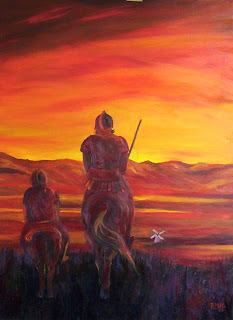
Well, as I was reading Frye's third section on Myth I grew more and more alarmed because I felt that nothing was really hitting home. No light bulbs were flashing. And this made me sad, (and a little frustrated) But then I reached the section entitled Theory of Archetypal Meaning: Demonic Imagery. And finally I came across a passage that reminded me of Kevin's blog and our previous class discussion on baseball.
"We met in the first essay the principle that the transmutation of act into mime, the advance from acting out a rite to playing at the rite, is one of the central features of development from savagery into culture. It is easy to see a mimesis of conflict in tennis and football, but, precisely for that very reason, tennis and football players represent a culture superiors to the culture of student duellists and gladiators."
-Frye pg. 148

Here again Frye uses a very well known analogy of sports. The evolution of the spectator sport from deadly barbaric display to civilized competitive sport concreted the formation of civilization. And one may argue that Rome was a great civilization with all their great buildings and inventions such as the aqueducts, but I agree with Frye. There was very little that was civil about Rome, for they forced innocent people into the deadly slavery of gladiators and the arena. But I digress...
"The turning of literal act into play is a fundamental form of liberalizing of life which appears in more intellectual levels as liberal education, the release of fact into imagination."
-Frye pg. 149

So just as Kevin discussed in his blog; in baseball the umpire is the "play" version of the scapegoat, the emperor is the umpire of the gladiator arena. The crowd boos the umpire for making a "bad" call as they would jeer the emperor, or what have you, if they gave a "thumbs up" when the crowd wanted a "thumbs down". And the "arena" has never really left our culture no matter how "civilized" we have become (or think we have). There will always be a sudo-sacred place, be it an arena, field, court or table, where the grand ritual of competition and defeat will take place. A crowd will flock and much-a-ruckus will be arisen by the throngs of avid fans of challenge and blood pumping spectacle that competition produces.

Sports have replaced our thirst for barbaric competition. We still get our violence with football, hockey, and rugby and with our growing ( and depleting, but that's a different blog) "civilness" we are entertained with less violent but still competitive sports such as tennis, golf, table tennis along with the many other sports that I don't pay attention to. The ritual of athletic entertainment no longer requires the blood sacrifice of death. The losers now only hang their heads when defeated instead of losing them all together.










